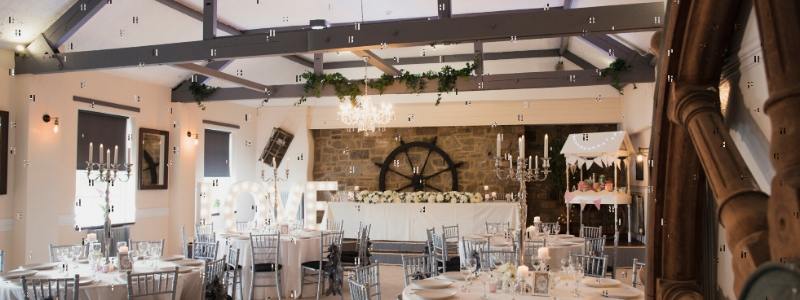Starting an event venue business is no small undertaking. It requires a lot of work and dedication. Many of the people who chose to open a venue do so for a passion.
The profitability of an event venue is dependent on factors such as reputation, customer spending power, customer acquisition and retention, marketing and sound financial planning.
There is such a wide range and mix of different types of event venues; answering this question in a couple of sentences is difficult. Making an event venue profitable takes time and lots of hard work. You need to understand the market that the business operates in and who will the customers be.
Do event venues make money?
The short answer to this is yes, absolutely, as long as they are managed correctly and have a good strategic plan in place. Any business will need a solid business plan in place before opening.
This business plan should include vital information about the target audience for the venue, the type of events it plans to host or attract and a marketing and financial plan. All of these should be justified with as much research and supporting data as possible.
The business plan should contain SMART objectives that give the owners a direction and metrics by which to measure their success. They can also be useful when things don’t go to plan you need to understand where changes are required.
How do event venues operate?

Typically, event venues will operate their events inhouse, or they will provide the venue to someone else for a rental fee. While the latter is nearly always the one with the least risk, it can lead to less income as the ‘hirer’ takes the event profit.
This article focuses on event venues which are privately owned, but it is common to find publicly owned entertainment venues. While many of the principles in this article may still apply, often publicly owned venues are driven by social outcomes over economic ones like profit.
Let’s look at three common sectors of the events venue industry, entertainment venues, wedding venues and business venues.
Entertainment Venues
Entertainment covers a wide range of venues including nightclubs, live music, bars, cinemas and casinos.
In entertainment venues, the margins can be incredibly tight, and the business model is often based on selling drinks or food as secondary sales while customers are on site.
Nightclubs

Nightclubs typically operate from late evening to the early hours of the morning. Beyond this, the options for extra business can be limited (mainly due to cleaning, bad odours, sticky floors, etc.) so there is real pressure to maintain profitability during minimal opening hours.
To achieve this profit, food and drink will be priced at a premium and staffing costs kept as low as possible.
Live Music Venues

Live Music Venues are similar to Nightclubs in that their trading window for profit can be very narrow and limited to only a few hours per day when a concert is happening.
Running a profitable Live Music Venue requires good contacts to book the right artistes to play. You need to be very clear about who the target market is for the venue and try to stick to that.
If the venue is a large concert venue, then it may have minimal opportunity for trading outside of music gigs. On the other hand, a smaller venue may be able to operate more widely during daytime hours.
There are of course other options for daytime hire for those larger concert venues. They could consider offering the venue for other types of events and meetings. This approach may depend on several factors. Venues used for live music often suffer from poor odour and sticky floors, so a formal business event during may not be suitable.
Natural light is not a requirement for Live Music Venues, so they often have no windows, again something that doesn’t lend itself to daytime hires.
Cinemas

Cinema falls into two categories generally, chain and independent. Large chains of Cinemas run to a formula that they consider to be the most efficient at generating profit for them.
This formula might allow them to benefit from economies of scale in buying power for things like the film licenses, popcorn and ice cream. Again, managing staffing levels is key to maintaining profitability.
Independent Cinema aims to be unique and offer something different from the big chains. Creating a unique experience often comes at a cost (licensing fees, staffing, etc.) so their pricing may be a little higher to be profitable.
For this reason, understanding who the target market for these venues is critical as they will be a lot more niche than the mainstream cinemas.
Outdoor Cinema venues have increased in popularity in recent years. Often taking place in car parks or parks they require all of the infrastructure to be installed on-site (e.g. bars, toilets and seating).
This work makes them a costly option on a one-off basis. Still, people will pay a premium for difference or quirkiness so again, having a defined target audience will help to ensure profitability.
Wedding Venues

Such is the breath of the wedding market across the world that it still represents a hugely lucrative business.
In the US the number of weddings is falling, but the spend per wedding is increasing, which is good news for wedding venues and suppliers. The average amount spent on weddings in the US is £33,900 (source) while in the UK it is £36,000 (source).
Wedding venues have the potential to be highly profitable but focusing on some of the critical ingredients is key to unlocking that potential.
First of all, the staff are key; they must be attentive to clients as this can make all the difference in recommendations in the future.
This attentiveness doesn’t just include the front of house staff, but also the staff and suppliers in the background. Being flexible is key to helping a couple have THEIR perfect wedding day. Understanding this is crucial.
The venue needs to understand it’s market. No venue can be all things to all people; it’s just not possible. Once you have a good understanding of the target audience, then everything about the marketing, sales and experience can be geared to them.
You could choose based the target market on things like
- Type of Budget (high or low)
- One particular theme (check out this link to theknot.com for some ideas)
- Location (beach, countryside, city etc.)
As with entertainment venues, wedding venues require a lot of hard work and perseverance to succeed and become profitable. Many owners and managers love the industry and providing dream days is the reason they started.
Business Venues
According to the 2020 BVEP UK Events Report, business events are worth £31.2B. It is a vast industry that spans exhibitions, conferences, political meetings, incentive travel, corporate hospitality and meetings.
While the equipment and theming for entertainment and wedding venues might be expensive, the entry-level of business events can be a lot lower, depending on the target market you’re aiming for.
This is not to say that this industry also enjoys a very lavish top end with huge amount of money being spent on major events lead by big business brands such as E3, SXSW or the World Travel Market.
The venues that host these types of event need to be huge and know that the margins they can charge make them very profitable.
So, what about the other end of the scale, smaller business venues like hotels, conference centres or even a local village hall. For these, day-to-day meetings and business events can be very profitable and often support their other social activities.
Typically these events will only require minimal set up with tables and chairs, plus some audiovisual equipment. If the venue already has these, then the cost is merely staff to set up the space.
Finally, any business event venue will need a pricing structure to recharge services such as refreshments, catering and additional equipment. This ensures there isn’t any ‘creep’ in profitability as the client asked for extras as the event gets closer.
How do you become an event venue owner?

There is no denying that buying bricks and mortar venues is an expensive business. If you’re keen to get into this business, this could be a huge barrier.
But perhaps that isn’t the end of the story, and if you’re prepared to put in the work, there may be another way if you are keen to get into the industry.
You could look around your local area for a venue that is currently underperforming or one where you can see the potential for another use, as with any business venture you need to research the local market thoroughly to see if demand is there.
You could approach the owner to see if they might be interested in a profit share for those events that you can bring to the venue. This profit share would be a win-win for both parties as they get their venue used when it would have been empty, and you get an income without having to own the space.
One final thought here, do you need to have a permanent venue? Perhaps you could look to see if there is an option to use a public space where you can host regular events?
Local governments often have a range of spaces they allow people to use. This space could be a lower-cost entry point for you to start running your events.
Other options here include renting disused warehouse space or venue sharing with another organisation. Get creative!
What impacts the profitability of an event venue?

Let’s look at some of the critical factors that affect the profitability of a venue. In many cases, being able to raise your price for the same service is key to this.
In the same way, managing your costs are equally as crucial to maintaining a healthy profit level. If you fail to manage your expenses (or recharge them to the client), then you will find the profitability drops significantly.
Like any business, failing to manage costs is often the cause of most problems in running a successful event venue.
Target Audience
Any event venue needs to have a clearly defined target audience, and that target audience needs to be able to afford the hire fees or services that event venue provides.
Defining this target audience ensures that you only spend marketing budgets, reaching those who will be interested in your event venue.
Start by figuring out some of the key attributes of your target market. These are commonly geographic and demographic features:
Example geographic features
- Are they local, regional or national
- How far will they travel
- Does climate affect your venue (e.g. seasonality for outdoor spaces)
- Cultural considerations
- How dense is the population around your venue
Example demographic features
- Age
- Gender
- Income levels
- Family lifecycle
- Marital status
- Ethnicity
- Education level
- Employment status
You can use a pick of these (and many others) to create a profile of your ideal target market. Sticking to this audience in all of your marketing and promotion means that the money you spend is highly targeted and so hopefully gains a better return on investment.
Location and facilities
The location of the venue impacts the price of hire. Areas that are convenient to get to and have excellent transport links will be able to attract higher rental fees.
In a similar sense, facilities like car parking and on-site accommodation can also increase fees and thus improve profitability.
Locations that have great natural beauty can also be valuable to specific industries, particularly weddings. Here, excellent backdrops for photos are a necessity and so having this on-site will increase the appeal (and hopefully price) of the venue.
Venue Reputation
Having an excellent reputation allows a venue to charge higher prices as it will be more in demand.
This is more money for the same space, and so profitability is increased. Getting a good reputation takes time, and you need to offer a consistently high-quality service to all customers.
93% of people (source) say that review impact their purchase decision so you should be encouraging happy customers to leave a review. Check out the top ten review sites here your venue could use.
There are a couple of things you can do to encourage this. First of all, just ask them! Either do this via email afterwards or encourage them to leave a review using posters or other subtle messages around the venue.
Other ways include incentives (like quizzes), making it easy (scannable QR codes) or use social media sites like Facebook or Instagram.
As with any industry, people only tend to leave reviews when they have had a fantastic experience or one which has been terrible. To keep your profitability up, you need to make sure they have the former!
Finding and retaining business
When running your event venue, finding clients is one of the most critical jobs in your organisations. You may have the skills as a salesperson, but if you don’t, you should employ someone with venue sales experience to ensure you have a steady supply of bookings coming in.
Not only that, but you must retain clients for future bookings. According to Forbes, it cost five times as much to find a new customer than it does to retain the ones that you already have. It is more profitable to retain customers than to find new ones.
When you consider that context, it’s worth putting more thought into the customer experience to ensure people come back to use your venue time after time and boost your profitability.
Understanding recharges
Recharges are those items that don’t come as standard with your standard venue hire packages for clients or customers. When someone comes to hire your venue, you need a clear starting point for what you charge.
You may have an all-inclusive package but be clear about what this actually ‘includes’. Clients will often push for extras that can erode any profit margin in a booking; it can be challenging to say no if you are keen to retain the client.
The solution to this is to have clear hire packages and then a price list of recharges or extras for things like refreshments, catering or equipment.
Good financial management
It goes without saying, and this one has been left until last as the singularly MOST crucial way that an event venue maintains its profitability.
Any event venue won’t know what the level of its profits is if it doesn’t tightly control its cost and what money it has coming in.
There should be regular reviews using high-quality monthly accounts that are kept up to date. If you don’t have the expertise yourself or inhouse, you should consider using external accountants!
Other questions
How do I price my venue?
Venues need to charge what their customers will pay. This process starts with research into your target audience and competitors to see what they are charging.
How do I start an event venue business?
Any event venue business needs to start with a detailed business plan that includes information about research, target audience, a budget, a marketing plan and other business operations. It needs to justify why you think this business will work and why you are the person to take it forward.

